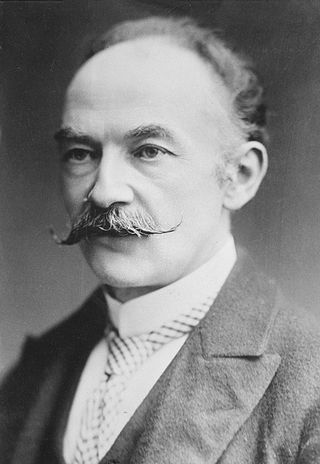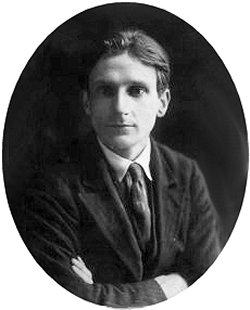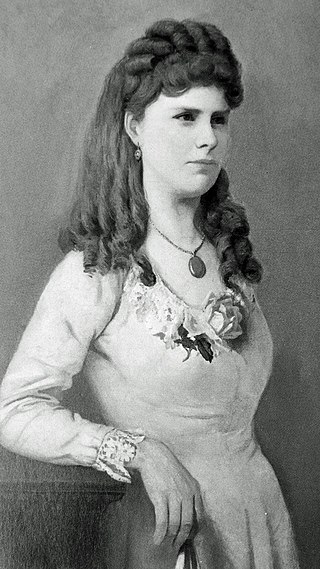Related Research Articles

Thomas Hardy was an English novelist and poet. A Victorian realist in the tradition of George Eliot, he was influenced both in his novels and in his poetry by Romanticism, including the poetry of William Wordsworth. He was highly critical of much in Victorian society, especially on the declining status of rural people in Britain such as those from his native South West England.

Siegfried Loraine Sassoon was an English war poet, writer, and soldier. Decorated for bravery on the Western Front, he became one of the leading poets of the First World War. His poetry both described the horrors of the trenches and satirized the patriotic pretensions of those who, in Sassoon's view, were responsible for a jingoism-fuelled war. Sassoon became a focal point for dissent within the armed forces when he made a lone protest against the continuation of the war with his "Soldier's Declaration" of July 1917, which resulted in his being sent to the Craiglockhart War Hospital. During this period, Sassoon met and formed a friendship with Wilfred Owen, who was greatly influenced by him. Sassoon later won acclaim for his prose work, notably his three-volume, fictionalised autobiography, collectively known as the Sherston trilogy.

Wilfred Edward Salter Owen MC was an English poet and soldier. He was one of the leading poets of the First World War. His war poetry on the horrors of trenches and gas warfare was much influenced by his mentor Siegfried Sassoon and stood in contrast to the public perception of war at the time and to the confidently patriotic verse written by earlier war poets such as Rupert Brooke. Among his best-known works – most of which were published posthumously – are "Dulce et Decorum est", "Insensibility", "Anthem for Doomed Youth", "Futility", "Spring Offensive" and "Strange Meeting". Owen was killed in action on 4 November 1918, a week before the war's end, at the age of 25.

Edmund Charles Blunden was an English poet, author, and critic. Like his friend Siegfried Sassoon, he wrote of his experiences in World War I in both verse and prose. For most of his career, Blunden was also a reviewer for English publications and an academic in Tokyo and later Hong Kong. He ended his career as Professor of Poetry at the University of Oxford. He was nominated for the Nobel Prize in Literature six times.
Henry Vaughan was a Welsh metaphysical poet, author and translator writing in English, and a medical physician. His religious poetry appeared in Silex Scintillans in 1650, with a second part in 1655. In 1646 his Poems, with the Tenth Satire of Juvenal Englished was published. Meanwhile he had been persuaded by reading the religious poet George Herbert to renounce "idle verse". The prose Mount of Olives and Solitary Devotions (1652) show his authenticity and depth of convictions. Two more volumes of secular verse followed, ostensibly without his sanction, but it is his religious verse that has been acclaimed. He also translated short moral and religious works and two medical works in prose. In the 1650s he began a lifelong medical practice.

Sir Edmund William Gosse was an English poet, author and critic. He was strictly brought up in a small Protestant sect, the Plymouth Brethren, but broke away sharply from that faith. His account of his childhood in the book Father and Son has been described as the first psychological biography.

This article focuses on poetry from the United Kingdom written in the English language. The article does not cover poetry from other countries where the English language is spoken, including the Republic of Ireland after December 1922.

Dame Edith Louisa Sitwell was a British poet and critic and the eldest of the three literary Sitwells. She reacted badly to her eccentric, unloving parents and lived much of her life with her governess. She never married but became passionately attached to Russian painter Pavel Tchelitchew, and her home was always open to London's poetic circle, to whom she was generous and helpful.
Georgian Poetry is a series of anthologies showcasing the work of a school of English poetry that established itself during the early years of the reign of King George V of the United Kingdom.

Thomas Percy was Bishop of Dromore, County Down, Ireland. Before being made bishop, he was chaplain to George III of the United Kingdom. Percy's greatest contribution is considered to be his Reliques of Ancient English Poetry (1765), the first of the great ballad collections, which was the one work most responsible for the ballad revival in English poetry that was a significant part of the Romantic movement.

Up The Line To Death: The War Poets 1914–1918 is a poetry anthology edited by Brian Gardner, and first published in 1964. It was a thematic collection of the poetry of World War I.
Poems of 1912–1913 are an elegiac sequence written by Thomas Hardy in response to the death of his wife Emma, in November 1912. An unsentimental meditation upon a complex marriage, the sequence's emotional honesty and direct style made its poems some of the most effective and best-loved lyrics in the English language.
Nationality words link to articles with information on the nation's poetry or literature.
—Closing lines of "Easter, 1916" by W. B. Yeats

Emma Lavinia Gifford was an English writer and suffragist. She was also the first wife of the novelist and poet Thomas Hardy.
Moments of Vision and Miscellaneous Verses is a collection of poems by English poet Thomas Hardy published in 1917. His largest poetic collection, Moments of Vision is unusually unified in emotional tone, and is considered to include some of the finest work of his late poetic career.
Late Lyrics and Earlier with Many Other Verses is a collection of poems by English poet Thomas Hardy, and was published in 1922. While covering a typical range of subjects - such as mismatchings, grotesqueries, and ironic memories - the poems generally take a musical shape, often remembering the past in ballad format.
Human Shows, Far Phantasies, Songs and Trifles is the penultimate collection of poems by English poet Thomas Hardy, and was published in 1925. A miscellaneous collection, Human Shows included old, new, and updated poems.
Time's Laughingstocks and Other Verses is a collection of poems by English poet Thomas Hardy, and was published in 1909. It includes poems of various dates, mainly concerned with rural, familial and provincial life.
Poems of the Past and the Present is the second collection of poems by English poet Thomas Hardy, and was published in 1901. A wide-ranging collection, divided into five headings, it contains some of Hardy's most powerful and lasting poetic contributions.
References
- ↑ F. B. Pinion, A Thomas Hardy Dictionary (1989) p. 238
- ↑ R. Taylor ed., Personal Notebooks of Thomas Hardy (1978) p. 263
- ↑ I. Ousby ed., The Cambridge Guide to Literature in English (CUP 1995) p. 830
- ↑ Quoted in M. Seymour-Smith, Thomas Hardy (London 1994) p. 810
- ↑ P. Campbell, Siegfried Sassoon (1999) p. 61
- ↑ S. M. Gilbert, Acts of Attention (1990) p. 44